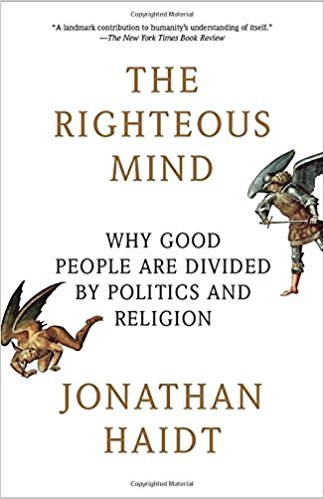The Righteous Mind Summary
5 min read ⌚
 Why Good People Are Divided by Politics and Religion
Why Good People Are Divided by Politics and Religion
Have you ever wondered how is it possible that there are so many good people that are unlike you? Probably not – because we all think that goodness is defined in accordance with our beliefs.
In “The Righteous Mind,” Jonathan Haidt ponders over this paradox.
About Jonathan Haidt
 Jonathan Haidt is an American social psychologist and one of the world’s top thinkers according to both “Foreign Policy” and “Prospect” magazines. He is Professor of Ethical Leadership at New York University’s Stern School of Business.
Jonathan Haidt is an American social psychologist and one of the world’s top thinkers according to both “Foreign Policy” and “Prospect” magazines. He is Professor of Ethical Leadership at New York University’s Stern School of Business.
In addition to “The Righteous Mind,” Haidt has authored another critically lauded book, “The Happiness Hypothesis,” which we included among our top psychology books. With Greg Lukianoff, he has also co-authored “The Coddling of the American Mind.”
“The Righteous Mind Summary”
Here’s an interesting thing for you to contemplate over:
If moral is something based on reason, then how is it that almost all of humanity came to consider rape and genocide morally revolting? Because – bear in mind – both are evolutionary justified!
Well, the thing is that, contrary to popular belief, morality is probably not founded on reason. Analyzing the reactions of people whose brain damage had petered out their emotional capacity, Antonio Damasio – we mentioned him here – discovered that we may not be “thinking machines which feel,” but “feeling machines which think.”
Namely, Damasio’s patients were incapable of distinguishing wrong from right, believing that everything is equally right (or wrong, for that matter).
The reason?
They couldn’t feel anything. They could think things over, of course; but, to them, this made no difference whatsoever.
The interesting part is that reasoning makes no difference whatsoever in everyday life, as well. Almost every decision you make, you make it in few seconds, using your intuition, or “gut feeling.” You use your reason not to rethink this – but to back it up.
In fact, many studies have shown that rational arguments have little effect. And that’s because cognitive dissonance and confirmation biases are almost unbeatable!
And because, well – we usually think that we’re the best. Not merely good or great – but almost morally impeccable. Socrates was asked two and a half millennia ago whether an invisible person would use his power to do good, and, the idealist that he was, he had to invent a utopia to answer “Yes.”
Even he, the original philanthropist, was afraid that the actual answer is “no.”
In scientific circles, “The Righteous Mind” is most famous as the book which popularized the Moral Foundations Theory. It was originally proposed by Haidt himself and Jesse Graham.
The idea is simple: morality everywhere is similar because it’s based on at least five foundations, which are inherently human. And, which must have developed similarly through the process of evolution. These five foundations are: care (developed in opposition to cheating), fairness (vs. cheating), loyalty (vs. betrayal), authority (vs. subversion), and sanctity (vs. degradation).
And, for most of the world’s societies, they have developed in a fairly similar manner. There’s just one small part of the world – the weird part – where morality is more individualized, more liberal, and more fragmentized concept.
And that weird part of the world is us. Western, educated, industrialized, rich, and democratic societies.
Or WEIRD, for short.
And that’s why we have problems agreeing on which ideological or political path is the better one.
You see, Jonathan Haidt argues, Republicans and Democrats are attracted by different foundations of morality. And by analyzing them, you may understand why blue-collar workers usually vote for Republicans – even though Democrats are more interested in things such as redistributing wealth.
Namely, the ideology of the Democrats revolves around two of the five moral pillars: care and fairness. They want to protect others and be fair even to those who don’t belong in their group. To Republicans, however, morality is an amalgam of loyalty, authority, and sanctity.
Blue-collar workers are attracted to the idea of fairness – but even more to those of loyalty and authority which are more appealing to WEIRD cultures. However, the working class is usually neither rich, nor highly educated.
The solution?
In Jonathan Haidt’s opinion – collaboration. That’s the only way the polarization of our society can stop – once and for all!
Key Lessons from “The Righteous Mind”
1. Morality Has At Least Five Foundations
2. Different Ideologies Are Based on Different Moral Foundations – And Yours Are WEIRD
3. Your Brain Has a “Hive Switch”
Morality Has At Least Five Foundations
Developed by Jonathan Haidt and Jesse Graham – and building on the work of Richard Shweder – the Moral Foundation Theory tries to link the origin of morality to some innate human foundations. Based on a large-scale study, Haidt and Graham have deduced at least five foundations: care, fairness, loyalty, authority, and sanctity.
All of these developed in opposition to some individualistically more appealing traits when early humans started living in communities. That way, care developed in opposition to harm, fairness to cheating, loyalty to betrayal, authority to subversion, and sanctity to degradation.
Different Ideologies Are Based on Different Moral Foundations – And Yours Are WEIRD
Now, what’s interesting is that morality is inherently contradictory. Some of its foundations, for example, are collectively justified, but individualistically seem unfair. And this is especially obvious in the modern WEIRD cultures, the outliers; namely, the Western, educated, industrialized, rich and democratic societies.
They have, once again, resurrected individuality. And, for many people in these WEIRD societies, authority, loyalty and sanctity are subordinate to liberty, a strong candidate for a six foundation. However, conservative political parties ground their ideologies on these foundations specifically.
And that’s why there’s all this polarization in society.
Your Brain Has a “Hive Switch”
An increased stimulation of the locusts’ hind legs causes increased levels of serotonin in their bodies. And increased levels of serotonin cause locusts to swarm – the biblical way!
Interestingly enough, a similar process can occur in your brain as well. If you’ve ever been part of a haka, or watched a highly charged sports match, you might have already experienced that. You know: heightened sense of community, the feeling of belonging to a group.
That’s your hive switch right there! And you want to hear something even more frightening?
Here it is:
Scientists have found that one psychedelic drug – psilocybin – can have the exact same effect!
Like this summary? We’d like to invite you to download our free 12 min app, for more amazing summaries and audiobooks.

“The Righteous Mind” Quotes
Understanding the simple fact that morality differs around the world, and even within societies, is the first step toward understanding your righteous mind. Share on X If you think that moral reasoning is something we do to figure out the truth, you’ll be constantly frustrated by how foolish, biased, and illogical people become when they disagree with you. Share on X Anyone who values truth should stop worshipping reason. Share on X If you grow up in a WEIRD society, you become so well educated in the ethic of autonomy that you can detect oppression and inequality even where the apparent victims see nothing wrong. Share on X People bind themselves into political teams that share moral narratives. Once they accept a particular narrative, they become blind to alternative moral worlds. Share on XEmir is the Head of Marketing at 12min. In his spare time, he loves to meditate and play soccer.


 Why Good People Are Divided by Politics and Religion
Why Good People Are Divided by Politics and Religion




